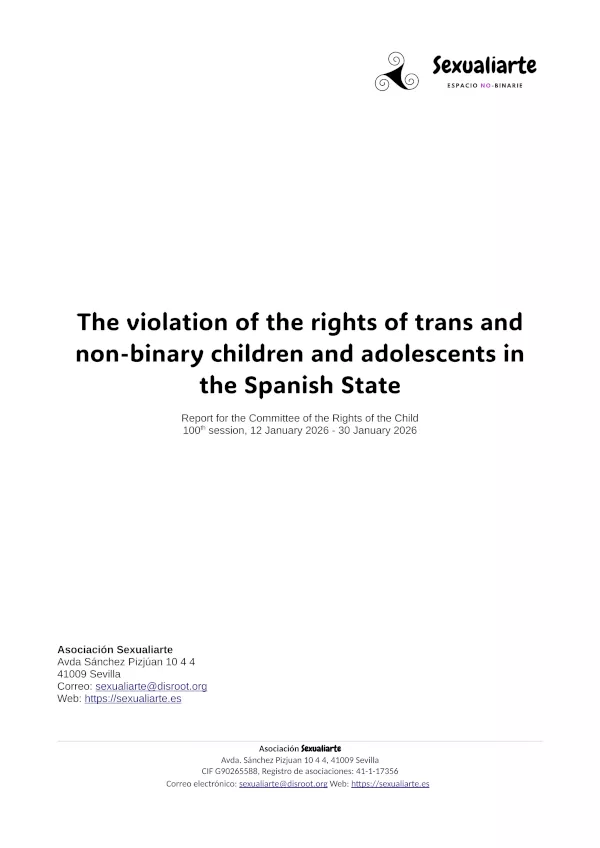
The violation of the rights of trans and non-binary children and adolescents in the Spanish State
Report for the Committee of the Rights of the Child
100th session, 12 January 2026 - 30 January 2026
Introduction
The Association Sexualiarte is a collective of non-binary people based in Seville, in Andalusia, Spain. Sexualiarte's vision is “to create, cultivate and promote a community based on care with an intersectional perspective that allows us to have a network of affection, political action and livable and dignified lives for non-binary, indigenous, non-normative and/or related identities.”
Non-binary people are all those whose identity does not coincide with the one assigned at birth and who find themselves outside the male/female hegemony, whether due to fluidity, simultaneity, political position or being partially or completely outside the binary system. Non-binary is understood as an umbrella term that includes, for example, agender, gender-fluid, genderqueer, bigender, demigirl, demiboy, among others, and ancestral or indigenous identities that do not fit into the imposed Western binary system.
Spain's new Trans and LGTBI Law, in force since 2 March 2023, introduced a procedure for changing the registered sex of minors over the age of 12, but excluded non-binary people, depriving them of the right to their gender identity and other legal protections.
In this report, we summarise violations of the rights of trans and non-binary children in Spain. We focus on the right to identity (Articles 7 and 8), the right to privacy (Article 16), the right to be free from all forms of violence (Article 19), the right to health (Article 24), and the right to education (Articles 28 and 29). We also refer to the right to non-discrimination (Article 2) and the best interests of the child (Article 3), which in the case of trans and non-binary children and adolescents often conflicts with the parental authority of parents or legal guardians. This can lead to the denial of the right to identity, health and education, among others, and may even constitute a form of child abuse.
Unfortunately, there is little quantitative research on trans and non-binary children and adolescents. The European Agency for Fundamental Rights' 2023 macro survey includes trans people aged 15 and over, but unfortunately there is insufficient data for trans girls (only for trans boys and non-binary people). A 2022 survey by the LGBTIQA NGO COGAM in secondary schools and vocational training centres in Madrid includes children from secondary school onwards, i.e. from around 12 years of age. According to this survey, 2.78% of students identify as transgender, with 0.56% trans boys, 0.54% trans girls, and 1.68% non-binary individuals.
